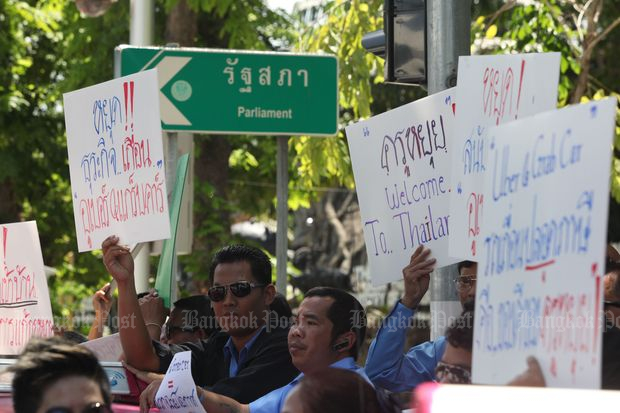
Some 30 taxi drivers protested against Uber and Grab at Parliament on Friday, urging lawmakers to take action against the ride-sharing service providers.
The rally took place during a motion filed by Wallop Tungkananurak, a National Legislative Assembly member, to ask Deputy Transport Minister Pichit Akrathit whether his ministry would legalise Uber and Grab as an alternative for the public.
He also wanted to know whether the ministry was preparing measures to minimise the conflicts between taxi and Uber and Grab drivers if it planned to do so.
Mr Pichit explained the ministry was still studying how to integrate the ride-sharing service providers.
"We are looking at two options: legalising them or passing a new law. Each has its pros and cons that call for careful consideration to benefit all stakeholders, especially users and some 120,000 taxi drivers. The image of the country must also be taken into consideration," Mr Pichit said.
During the session, some 30 tax drivers parked their cars in front of Parliament and held posters slamming the ride-sharing service providers.
Vorapol Kaewkhunthod, chairman of the taxi driver professional group, submitted a letter to NLA president Pornpetch Wichitcholchai to seek justice for taxi drivers, who operate under the 1979 land traffic law.
"Foreign operators such as Uber and Grab are gaining support. Since they provide the same service, they are stealing jobs [from us]. They also destroy a Thai industry, not to mention the fact they are illegal since they use 'black licence plate' cars to serve," he said, referring to the licence plates with black print designated to privately owned vehicles.
Mr Vorapol's group also had issues with credit card payments.
"They allow users to pay by credit cards, taking the revenue that should have belonged to Thais from the country."
However, he suggested a way out for Uber and Grab.
"If they want to continue doing business in Thailand, they need to register their cars as public vehicles and their drivers must have public driving licences.
"We came here to seek justice and protest against such illegal operations," Mr Vorapol said.
Clashes between taxi drivers and Uber drivers have been increasing and getting more physical in recent months as the former feel the latter are stealing customers from them. Taxi drivers also think the competition is not fair since they are bound by regulations while Uber drivers are not.
On the other hand, several people prefer the conveniences Uber and Grab has to offer, especially cars with better conditions, app booking and tracking and credit card payment. More importantly, many say they are fed up with taxis, many of whom do not want to pick them up during rush hours or at certain locations, or prefer to take only foreign customers.